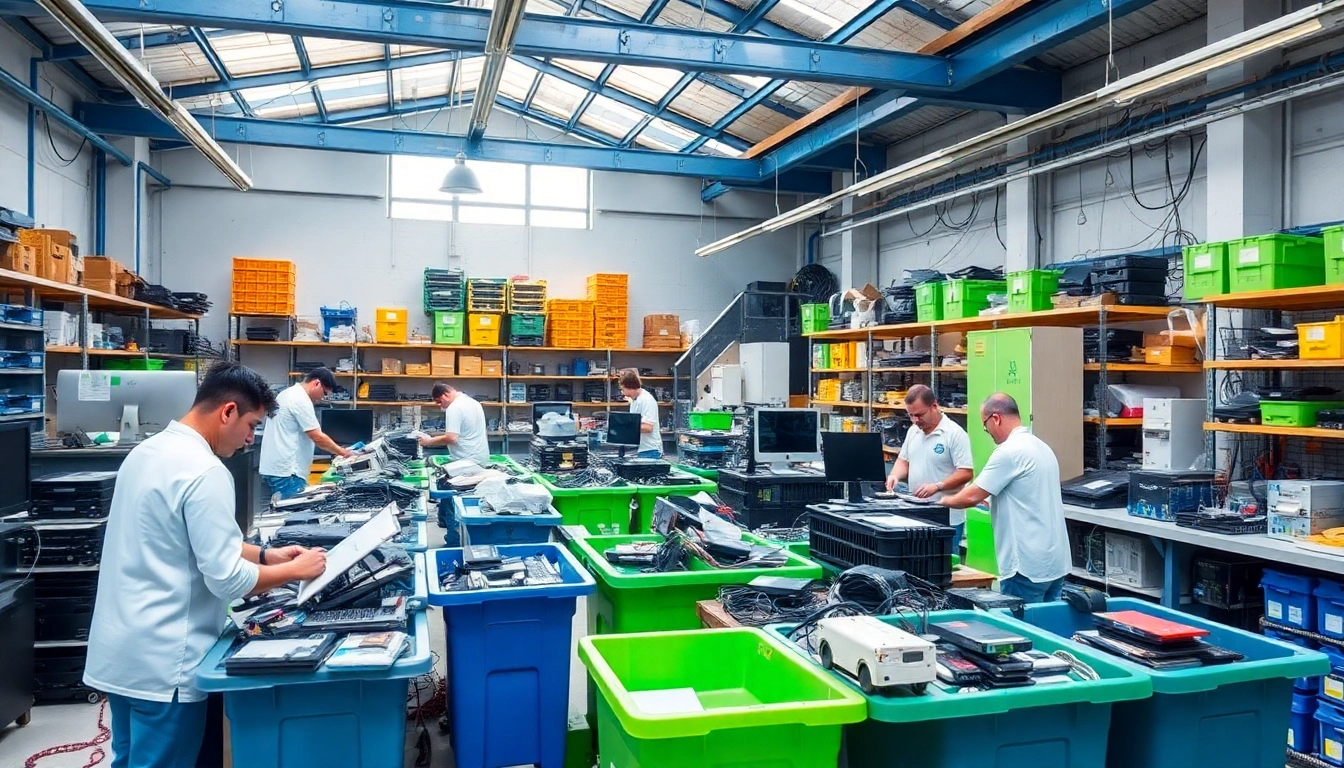Understanding IT Recycling Reading
As technologies continue to evolve at a rapid pace, managing electronic waste is becoming increasingly important. IT recycling is a solution that addresses not only environmental concerns but also the safe disposal of sensitive data. In Reading, businesses and individuals can engage in it recycling reading to ensure their old IT equipment is disposed of responsibly and sustainably.
What is IT Recycling?
IT recycling refers to the process of collecting, dismantling, and processing obsolete or unwanted electronic equipment, such as computers, servers, and other IT devices, to recover valuable materials and ensure proper waste disposal. This process not only helps to divest hazardous materials from landfills but also allows for the recovery of metals and recyclable materials, promoting a circular economy.
Importance of IT Recycling in Reading
In Reading, the importance of IT recycling cannot be overstated. With a significant number of businesses relying on IT equipment, the volume of electronic waste has surged. Engaging in IT recycling contributes to environmental sustainability, reduces pollution, and conserves natural resources. Additionally, it helps local communities adhere to regulations and protects sensitive data.
Local Regulations and Compliance
Local regulations regarding e-waste disposal are in place to ensure the responsible recycling of electronic products. In Reading, businesses must comply with the Waste Electrical and Electronic Equipment (WEEE) Directive, which sets forth standards for safe and sustainable recycling practices. Understanding these regulations is critical for businesses looking to dispose of their IT equipment responsibly.
Benefits of IT Recycling Reading Programs
IT recycling programs offer numerous benefits that extend beyond mere compliance with regulations. From environmental advantages to financial benefits, IT recycling provides multi-dimensional value. Let’s explore some of these benefits.
Environmental Impact
The environmental impact of IT recycling is profound. When electronic waste is properly recycled, harmful substances, such as lead and mercury, are less likely to leach into the environment. Moreover, recycling conserves valuable natural resources, reduces energy consumption during manufacturing processes, and minimizes carbon emissions associated with producing new devices.
Data Security Considerations
Data security is a paramount concern for businesses when it comes to disposing of IT equipment. IT recycling providers often use certified data destruction methods that ensure sensitive information is irretrievably destroyed before devices are recycled. This prevents data breaches and protects companies from liability associated with improper disposal of electronic devices.
Cost Savings for Businesses
Participating in IT recycling can result in significant cost savings for businesses. By recycling old equipment instead of purchasing new devices at full price, companies can allocate finances more efficiently and take advantage of potential tax incentives associated with sustainable practices. Additionally, IT recycling providers often offer free pickup services, further reducing operational costs.
How to Choose an IT Recycling Provider in Reading
Selecting the right IT recycling provider is crucial for ensuring compliance, security, and effective recycling methods. Here are the key factors to consider.
Key Factors to Consider
- Certification: Choose providers with certifications such as R2 (Responsible Recycling) or e-Stewards, which indicate adherence to ethical and environmentally sound practices.
- Services Offered: Look for providers who offer comprehensive services, including pickup, data destruction, and reporting.
- Experience: Experienced recyclers tend to have better processes in place for handling IT equipment.
Evaluating Certifications and Compliance
It is essential to verify that the IT recycling provider complies with local and international regulations. This includes confirming their certifications, which demonstrate their commitment to responsible recycling practices and data security. Be sure to ask about their data destruction policies to ensure compliance with data protection regulations.
Customer Reviews and Reputation
Researching customer feedback and online reviews can provide insight into the reputation of IT recycling providers. A reliable provider will have positive reviews regarding their customer service, efficiency, and adherence to commitments. Checking testimonials and case studies can also help validate their claims.
Step-by-Step Guide to IT Recycling Reading
Here’s a practical guide for businesses and individuals on how to recycle their IT equipment effectively.
Preparing Your Equipment for Recycling
Before recycling your IT equipment, it is vital to prepare your devices appropriately. This includes:
- Backing up any important data.
- Performing a factory reset or using software tools to wipe sensitive data.
- Separating reusable components which might be donated or reused.
Finding a Suitable Provider
Once your equipment is prepared, the next step is to find a suitable IT recycling provider in Reading. Utilize local directories, online resources, and networks to compile a list of potential providers. Assess their services based on the criteria discussed previously.
Understanding the Pickup Process
After selecting a provider, coordinate the pickup process. Many recyclers offer flexible options for equipment collection, including on-site pickups or scheduled drop-off facilities. Understanding their process and requirements will ensure a seamless recycling experience.
Frequently Asked Questions about IT Recycling Reading
What types of equipment can be recycled?
A wide range of IT equipment can be recycled, including computers, laptops, printers, servers, monitors, and networking devices. It’s best to check with your recycling provider for specific restrictions.
How does the recycling process work?
The recycling process typically involves collection, data destruction, disassembly of equipment, recovery of valuable materials, and responsible disposal of hazardous components following the WEEE regulations.
Are there any costs associated with IT recycling?
Many IT recycling providers offer free pickup services for businesses. However, additional fees may apply for specific services like data destruction or specialized handling of certain equipment.
What happens to the data on my devices?
Reputable IT recycling providers ensure data security by employing certified data destruction methods, including degaussing and physical destruction, to render data irrecoverable before recycling.
Can businesses schedule regular pickups?
Yes, many IT recycling providers offer the option for businesses to schedule routine pickups, ensuring ongoing compliance with recycling regulations and helping manage e-waste effectively.

